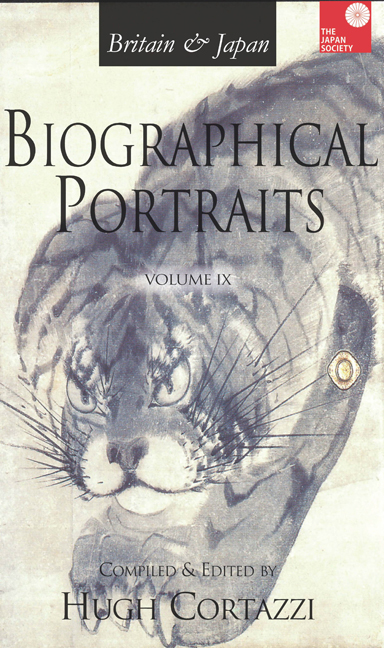Book contents
- Frontmatter
- Contents
- Introduction
- List of Contributors
- Index of Biographical Portraits in Japan Society Volumes
- PART I JAPAN IN BRITAIN: THINGS JAPANESE
- PART II BRITAIN IN JAPAN: TRADE
- BRITISH ACTIVITIES
- MISSIONARIES
- MUSIC, DRAMA AND FILM
- EPISODE
- PAINTERS
- JOURNALISTS
- JAPANESE WOMEN PIONEERS
- PART III SCHOLARS AND WRITERS: JAPANESE
- BRITISH
- PART IV POLITICIANS AND OFFICIALS: JAPANESE
- BRITISH OFFICERS
- BRITISH JUDGES AND A DIPLOMAT
- BRITISH POLITICAL FIGURES
- Index
1 - The Great Japan Exhibition, 1981–1982
Published online by Cambridge University Press: 30 April 2022
- Frontmatter
- Contents
- Introduction
- List of Contributors
- Index of Biographical Portraits in Japan Society Volumes
- PART I JAPAN IN BRITAIN: THINGS JAPANESE
- PART II BRITAIN IN JAPAN: TRADE
- BRITISH ACTIVITIES
- MISSIONARIES
- MUSIC, DRAMA AND FILM
- EPISODE
- PAINTERS
- JOURNALISTS
- JAPANESE WOMEN PIONEERS
- PART III SCHOLARS AND WRITERS: JAPANESE
- BRITISH
- PART IV POLITICIANS AND OFFICIALS: JAPANESE
- BRITISH OFFICERS
- BRITISH JUDGES AND A DIPLOMAT
- BRITISH POLITICAL FIGURES
- Index
Summary
INTRODUCTION
‘THE GREAT JAPAN Exhibition: Art of the Edo Period 1600–1868’, held at the Royal Academy of Arts in Piccadilly from 24 October 1981 to 21 February 1982, was a significant and unprecedented event in UK-Japanese cultural relations. According to the Royal Academy's Annual Report of 1982 it was the most comprehensive exhibition ever devoted to its subject, even in Japan itself.
With a budget of over £2m in Britain alone, (much more including Japanese expenses), and installation costs of over £400,000, the exhibition was the most expensive ever organized by the Royal Academy. In spite of misfortunes such as transport strikes and serious disruption caused by snow, over 523,000 paid visits to the exhibition took place. This was one of the highest attendances ever achieved in the history of the Royal Academy. The exhibition, which attracted extensive media coverage, even achieved a small surplus for the Royal Academy of £18,000.
Many observers had feared that because of the complexity and cost of the exhibition it could never be mounted. The economic climate in Britain at the time was particularly difficult.
BACKGROUND
This was not the first exhibition of Japanese art in Britain. After the success of a small exhibition of Japanese arts and crafts at an exhibition in Pall Mall in 1854 Sir Rutherford Alcock, the first British minister to Japan, had arranged for some Japanese art objects to be displayed at the international exhibition held in London in 1862. The Japan-British Exhibition of 1910 displayed an extensive range of Japanese art as well as commercial and industrial products.
The International Exhibition of Chinese Art at The Royal Academy (28 November 1935–7 March 1936) had proved so popular that several new China-focused faculties were established at British universities largely as a result. The Royal Academy had hoped to follow the success of the Chinese exhibition with a similar major Japan exhibition, but the deteriorating international situation put a stop to this. In 1973/74 the Royal Academy put on an exhibition focused on China's early dynasties up to and including the Yuan Dynasty (The Genius of China: An Exhibition of Archaeological Finds of the People's Republic of China, 29 September 1973–23 January 1974).
- Type
- Chapter
- Information
- Britain & Japan Biographical Portraits Vol IX , pp. 1 - 14Publisher: Amsterdam University PressPrint publication year: 2015



